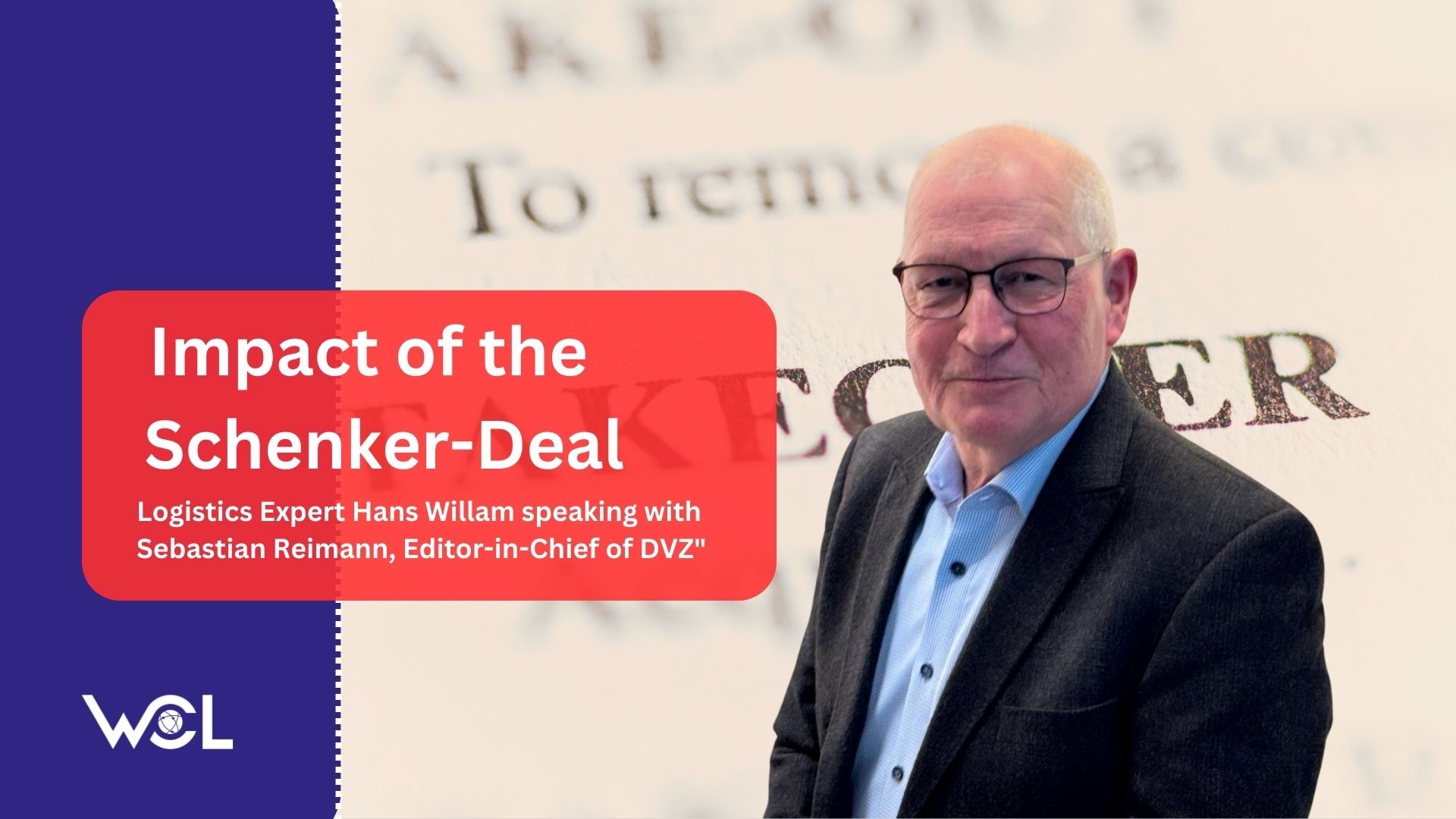In an interview with Sebastian Reimann from DVZ, Hans Willam, Senior Advisor at WCL Worldwide Consultants in Logistics and logistics expert, shares his insights on the Schenker-DSV deal. Willam highlights the strategic impacts of this acquisition on Schenker and the entire logistics industry. A big thank you to DVZ and Sebastian Reimann for allowing us to publish this article.
For our non-German speaking readers, we have prepared the following translation.
September 17, 2024 | by Sebastian Reimann
Since Friday morning, it’s official: Deutsche Bahn (DB) is selling its logistics subsidiary Schenker to DSV. If everything goes as planned and both the federal government and DB’s supervisory board approve the deal promptly, the venerable company name will disappear after 153 years with the closing planned for the second quarter of 2025. DSV is paying 14.3 billion euros for the world’s fourth-largest logistics company and will become the global number one by revenue. DSV will generate 39.3 billion euros, which is 3 billion euros more than DHL and 12 billion euros more than Kühne + Nagel. Schenker is valued at 14 times its operational EBIT profit. According to CEO Jens Lund, this is the largest acquisition ever completed in the logistics industry.
But what does the deal mean for Schenker’s employees? How will customers react? What challenges will DSV face with integration? And what impact will the acquisition have on the market structure? DVZ consulted experts to get insights.
The Workforce
According to DSV CEO Jens Lund, it is unlikely that union representatives on DB’s supervisory board will withhold their approval for the deal. DSV has promised German Schenker employees job security for two years after the closing. Jens Lund assumes that everyone will behave “professionally.”
Thomas Lieb, former Schenker CEO and current chairman of Hellmann’s supervisory board, believes that all overlapping structures will be under review by DSV. Schenker currently has three headquarters in Germany: two in Frankfurt for Germany and Europe, and one in Essen (Schenker AG). DSV itself has mentioned plans to “adjust” between 1,600 and 1,900 full-time positions in Germany. Lieb also expects that headquarters in Asia and America will be reviewed, followed by national company headquarters.
On the other hand, Hans Willam, founder and current senior advisor of the consulting network Worldwide Consultants in Logistics, wonders whether key performers will remain loyal to the new company or choose to leave. This is significant, as DSV’s official approach in such large acquisitions is to hold internal competitions for management positions, selecting the most suitable candidates. In Denmark, this is known as the “best athlete for the job.” However, after the Panalpina acquisition, at least 40 of the top 50 Panalpina managers left the company, according to the expert.
The Customers
Willam anticipates that DSV will experience customer losses, as was observed during the Panalpina and Agility acquisitions. Lieb estimates that approximately 15% of Schenker’s current business will enter the market. Competitors are expected to seize the opportunity to lure Schenker’s customers away. Both experts also mention “change of control” clauses, which allow customers to terminate their contracts in such situations. Additionally, DSV does not have the best reputation in global key account management, particularly in cross-product management, according to Willam.
Integration Challenges
Experts are also curious to see how well DSV can merge the different company structures. While Schenker operates in a clear matrix, DSV follows a structure with divisions and strong regional and national leadership. Willam expresses doubts about the long-term viability of this structure within an organization of about 140,000 employees. He expects DSV will need to significantly strengthen global product management in ocean and air freight, reducing the power of national heads and branch managers.
Market Changes
By volume, DSV will become the world’s largest air freight forwarder and just behind Kühne + Nagel as the second-largest in sea freight. In contract logistics, DSV will rank third globally in terms of warehouse space. Additionally, in land transport, DSV will emerge as “a leading European player.”
The impact of the deal on the general cargo cooperation IDS, where DSV is a partner and shareholder, is still unclear. DSV currently operates 7 of IDS’s 53 locations in Germany. “We can only now begin discussions,” says Managing Director Michael Bargl. Operationally, nothing will change for the network for now, and network security is ensured through long-term contracts, which are valid until at least early 2027. “We will need to sit down and see how things develop in the long term,” adds Bargl.
Co Editor: Lutz Lauenroth

